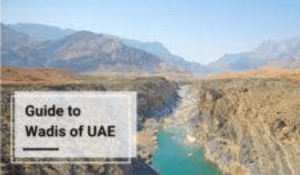During the winter season in UAE, it’s the perfect time to go outdoors and explore UAE’s rich natural biodiversity and beauty!
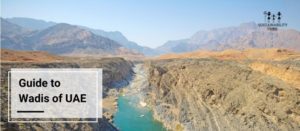
Recently we and our friends with their kids have been to a day out in Wadis in Fujairah. The meaning of the Arabic word ‘Wadi’, is a valley, sometimes the word is even used for river bed. Most of the wadis are situated in rocky mountains near the East coast of the UAE. During winter Dec-Feb rare rain occurs. This rainwater gets collected in these wadis to form a water pool known as the wadi pool.
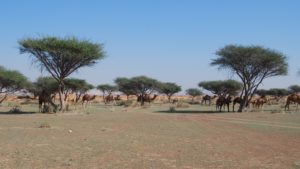 We packed our homemade meals and started from Dubai early in the morning. Just before reaching the mountains, we found a nice empty space to have our breakfast. It was lovely to have breakfast in early sunlight
We packed our homemade meals and started from Dubai early in the morning. Just before reaching the mountains, we found a nice empty space to have our breakfast. It was lovely to have breakfast in early sunlightunder a tree! As soon as we finished our breakfast, a herd of camels appeared from somewhere. It was a great photo opportunity! But there was no camel farmer in our sight and the camels started approaching us, so we decided to just drawback and started our journey to wadis. On the way we took a quick stop when we saw a lone local farmer selling dates and honey, it was hard to resist so we bought dates.
Wadi Al Asimah and Wadi Al Sidra Sana
Our first break was Wadi Al Asimah. The wadi beds are rocky so after a short drive, we decided to explore the wadi on foot. That way you get to enjoy it more and it’s better for the environment instead of going for well-known ‘wadi bashing’.

We even found a wadi pool. The dams are built in wadis to collect rainwater. Many farmers use this to water their farms. You get to see thick natural vegetation in wadis, thanks to wad pools.
We spent some time observing unique wadi flora and fauna in the wadi and then we left for the next wadi. We got to see a few dams during wadi hopping. Some dams were old and some dams were properly built. 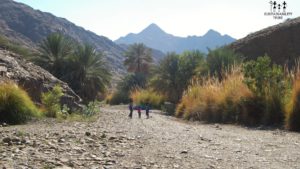

There are some things I noticed about wadis, at the entrance of the wadi there was thick vegetation but as we walked deeper the vegetation became thinner and the wadi gets open in larger rocky planes like a dry river bed.
Driving in this area is a bit tricky, sometimes there were a few really big rocks and sometimes steep slopes. But as long as you have someone with off-road driving experience it’s safe. The kids enjoyed our wadi outing, there is so much to see, learn. Plus our wadi day was very active, we climbed up many places to see things and even found out some caves. These mountains are very interesting if you see them up close.
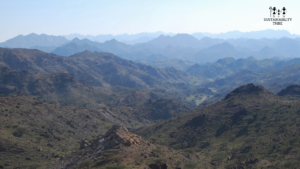
We got lost once, it was so beautiful outside that keeping eyes on the map was very difficult. But then we ended up on a beautiful spot uphill, everyone loved the view so we had our picnic lunch there! When you are in the mountains, you find some local people, but rarely. They always help you and are very kind farmers. Thanks to one such kind soul, we could find our route back to the road before the sunset!

Of course, no Fujaira Trip can be complete without Masafi Friday stopover. Our favorite things to do there are having roasted corn and masala chai along with some plant shopping.
Wadis are popular for camping and off-roading in UAE. There are even Wadi Bashing tours in UAE. But unfortunately, the result of that irresponsible tourism in wadis is now pollution.
I found plastic bottles, plastic bags, cans, BBQ coal, etc scattered everywhere in wadis. The natural water of the wadi pool was completely ‘unclean’! Cans, bottles, disposable glasses, cigarettes were floating in the water. This creates a hazard to local fish species in wadi pool water.
Biodiversity in Wadis
Wadis are unique natural systems in the UAE, one of the 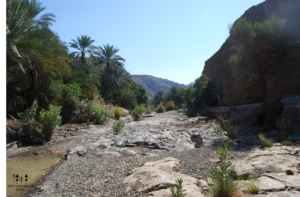 very few freshwater sources. Some wadis have pools and some wadis are spring-fed. Wadis have a very rich biodiversity. There are some very unique native species found in those wadis which are very sensitive and vulnerable. For example, in Wadi Wurayah the only found native fish is Garra borreliae. Wadis are also home to some native endangered wildlife like Arabian Tahr. Fujairah Municipality has protected this very popular & beautiful Wadi Wurayah since March 2009.
very few freshwater sources. Some wadis have pools and some wadis are spring-fed. Wadis have a very rich biodiversity. There are some very unique native species found in those wadis which are very sensitive and vulnerable. For example, in Wadi Wurayah the only found native fish is Garra borreliae. Wadis are also home to some native endangered wildlife like Arabian Tahr. Fujairah Municipality has protected this very popular & beautiful Wadi Wurayah since March 2009.
 very few freshwater sources. Some wadis have pools and some wadis are spring-fed. Wadis have a very rich biodiversity. There are some very unique native species found in those wadis which are very sensitive and vulnerable. For example, in Wadi Wurayah the only found native fish is Garra borreliae. Wadis are also home to some native endangered wildlife like Arabian Tahr. Fujairah Municipality has protected this very popular & beautiful Wadi Wurayah since March 2009.
very few freshwater sources. Some wadis have pools and some wadis are spring-fed. Wadis have a very rich biodiversity. There are some very unique native species found in those wadis which are very sensitive and vulnerable. For example, in Wadi Wurayah the only found native fish is Garra borreliae. Wadis are also home to some native endangered wildlife like Arabian Tahr. Fujairah Municipality has protected this very popular & beautiful Wadi Wurayah since March 2009.To learn more about rich biodiversity in the UAE wadies, get a copy of our UAE Outdoors Scavenger Hunt E-book. This unique ebook covers all ecosystems in the UAE including mountains and wadies, coast, desert as well as urban ecosystem and our scavenger hunt game will add some fun and exciting element to your outdoor trip.
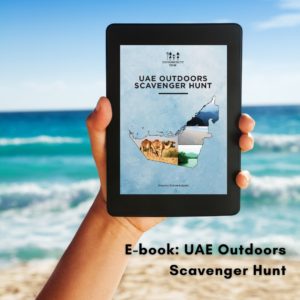
Wadi Dos and Don’ts
- Take only 4 x 4 to go in wadis with the spare tire.
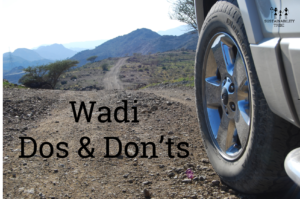
- Don’t forget to take the Explorer Off-Road UAE guide for routes.
- Check the weather before you go there. During rain, there is a danger of flash floods.
- When in wadis don’t turn on loud music to have fun. You will scare the vulnerable wildlife which you are not aware of.
- While driving in wadis be careful. Don’t drive ruthlessly and scramble all small new plants and species in wadis. It can take a long time to regrow natural flora and fauna.
- Avoid campfire in wadis, you can harm biodiversity.
- Don’t contaminate wadi pools.
- Don’t leave your unwanted pets in wadis and mountains. Those exotic animals will harm local sensitive biodiversity. Native biodiversity can not withstand in front of aggressive animals from outside.
- Don’t litter in wadis and mountains. Take your rubbish with you and dispose of it in proper garbage bins on the petrol pump. There is no cleaning staff in mountains like any malls in Dubai!
- Try to take reusable items with you to reduce waste.
I hope this guide will help you in planning your Wadi Trip!
There are not just wadis in UAE where can you enjoy the outdoors, there are many ‘close to nature’ places that you can find in our post, Top Eco-experience places to visit around UAE.

